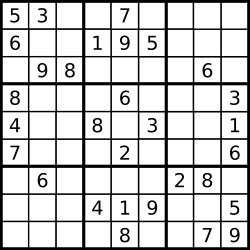Write a program to solve a Sudoku puzzle by filling the empty cells.
A sudoku solution must satisfy all of the following rules:
- Each of the digits
1-9must occur exactly once in each row. - Each of the digits
1-9must occur exactly once in each column. - Each of the digits
1-9must occur exactly once in each of the 93x3sub-boxes of the grid.
The '.' character indicates empty cells.
Example 1:

Input: board = [["5","3",".",".","7",".",".",".","."],["6",".",".","1","9","5",".",".","."],[".","9","8",".",".",".",".","6","."],["8",".",".",".","6",".",".",".","3"],["4",".",".","8",".","3",".",".","1"],["7",".",".",".","2",".",".",".","6"],[".","6",".",".",".",".","2","8","."],[".",".",".","4","1","9",".",".","5"],[".",".",".",".","8",".",".","7","9"]] Output: [["5","3","4","6","7","8","9","1","2"],["6","7","2","1","9","5","3","4","8"],["1","9","8","3","4","2","5","6","7"],["8","5","9","7","6","1","4","2","3"],["4","2","6","8","5","3","7","9","1"],["7","1","3","9","2","4","8","5","6"],["9","6","1","5","3","7","2","8","4"],["2","8","7","4","1","9","6","3","5"],["3","4","5","2","8","6","1","7","9"]] Explanation: The input board is shown above and the only valid solution is shown below:
Constraints:
board.length == 9board[i].length == 9board[i][j]is a digit or'.'.- It is guaranteed that the input board has only one solution.
Idea:
Create 3 tracking arrays:1 - 9 occur once in whole row, whole col, whole box.[ith row][number] [ith col][number] [ith box][number]ex: [ith row][N] = 1 means ith row already use number NDFS/Backtracking Travese the board from left to right, row by row Try to fill 1-9, success return, if not success, recover data and try next element
Solution:
/**
* @param {character[][]} board
* @return {void} Do not return anything, modify board in-place instead.
*/
var solveSudoku = function(board) {
// 1 - 9 occur once in whole row, whole col, whole box
// [ith row][number] [ith col][number] [ith box][number]
// ex: [ith row][N] = 1 means ith row already use number N
let rows = Array.from(new Array(9), () => new Array(10).fill(0));
let cols = Array.from(new Array(9), () => new Array(10).fill(0));
let boxes = Array.from(new Array(9), () => new Array(10).fill(0));
for (let i = 0; i < 9; i++) {
for (let j = 0; j < 9; j++) {
const c = board[i][j];
if (c !== '.') {
let num = parseInt(c);
let bx = Math.floor(j / 3);
let by = Math.floor(i / 3);
rows[i][num] = 1;
cols[j][num] = 1;
boxes[by * 3 + bx][num] = 1;
}
}
}
dfs(board, 0, 0, rows, cols, boxes);
};
function dfs(board, x, y, rows, cols, boxes) {
// exit recursion condition, reach to the end;
if (y === 9) return true;
// traverse from left to right, then next row
let nextX = (x + 1) % 9;
let nextY = nextX === 0 ? y + 1 : y;
// already has number, DFS next element
if (board[y][x] !== '.') return dfs(board, nextX, nextY, rows, cols, boxes);
// fill number from 1 - 9
for (let i = 1; i <= 9; i++) {
let bx = Math.floor(x / 3);
let by = Math.floor(y / 3);
let box_index = by * 3 + bx;
// if not breaking the following 3 rules
if (!rows[y][i] && !cols[x][i] && !boxes[box_index][i]) {
// modify, fill the number
rows[y][i] = 1;
cols[x][i] = 1;
boxes[box_index][i] = 1;
board[y][x] = i.toString();
// Try to fill next element, if success return true, or recover
if (dfs(board, nextX, nextY, rows, cols, boxes)) return true;
// recover data
board[y][x] = '.';
boxes[box_index][i] = 0;
cols[x][i] = 0;
rows[y][i] = 0;
}
}
return false;
}